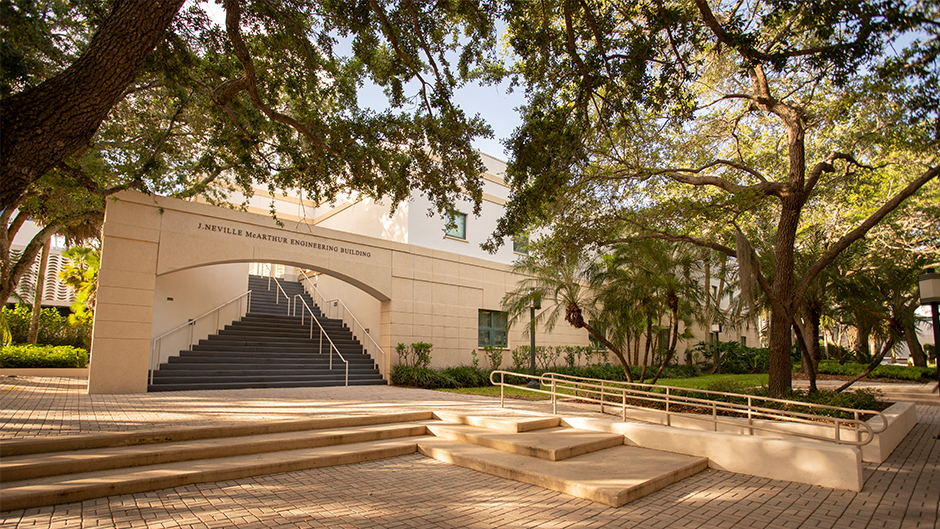Capping off an exciting wave of new faculty joining Miami Engineering in the 2022-2023 academic year, Chang-Yu Wu will become the chair of the Department of Chemical, Environmental, and Materials Engineering in Spring 2023.
“Engineers want to make the world a better place,” said Wu. “They are often motivated by a problem they or their community faced.”
“My childhood experiences drove me to study air quality,” Wu said. “I grew up in Taipei, Taiwan, and when I was a kid, the city was heavily polluted. I suffered from asthma and constant coughing,” said Wu. “It really made me question, ‘What can I do to address this issue so that others don’t have to face the same problems?’”
His career was changed forever by an early opportunity when someone saw potential in him that he was not aware of. “There are people who transformed my life without meaning to. When I started my faculty career at the University of Florida, I was approached by a researcher from the Air Force Research Laboratory who needed someone to work on bioaerosols. My dissertation was about metal aerosols in combustion systems, but he assured me that I could just treat bioaerosols the same way.” Wu soon discovered this was not true in practice and became hooked on bioaerosols.
His impact in COVID-19 research
Back in 2010, during the global swine flu pandemic, Wu worked with the Air Force Research Laboratory on a project investigating how to regenerate masks to protect the public, considering that mask production capacity cannot meet the demand during a pandemic.
In early 2020, Wu led a team of researchers that collected live SARS-CoV-2, the virus that causes COVID-19, in aerosol for the first time in the world. Wu's collaboration with an R&D company and a virologist also produced a virus aerosol sampler, now commercially available to the world, that could efficiently sample respiratory virus and maintain its viability which is needed to assess exposure risk.
“Vaccines and other health measures have helped us adapt to COVID-19,” Wu said, “but this pandemic has taught us that we need to better prepare ourselves for future outbreaks.”
“We also have to think about balancing energy efficiency and human health indoors due to COVID-19,” Wu said. “After the US energy crisis in the 1970s, buildings were made more energy efficient, but we have now realized from COVID-19 that effective ventilation needed for lowering the risk to respiratory virus may have suffered in that process."
His Vision for the Future
“As we build this entirely new department, I’m excited to leverage Miami’s strengths to attract diverse talent from all over the world,” Wu said. “Intellectual and cultural diversity is critical in education and creativity. Our curriculum needs to connect our students to groundbreaking research conducted across the University. We need to help our engineers become better citizens as well, working with those in the humanities, for example, to learn how to ask questions from beyond a strictly engineering perspective to better solve real-world problems and to serve our society.”
“I’m excited to build a department focused on nature-inspired chemical processes and novel materials for sustainable humanity and environment,” Wu said. “We can learn so much from nature.”
Wu has remarkable enthusiasm for the varied applications of engineering, looking forward to producing Miami Engineers capable of impacting the world, for example, in terms of climate change and global health. “Trees, for example, are very good at removing carbon dioxide from the atmosphere,” Wu said. “Chemical engineers, such as Dean Pratim Biswas, have been working to learn from these natural processes to aid global climate engineering goals.”
“The human body can also teach us so much about virus aerosols,” Wu said. “As human beings, we’re very good at capturing virus aerosols, which is why we become infected. If we can simulate this infection process, we may be able to produce a device that senses virus aerosols from an environment.”
"Dr. Chang-Yu Wu is a star in the field of aerosol science and technology,” said Pratim Biswas, dean of the College of Engineering and professor in the Department of Chemical, Environmental, and Materials Engineering. “He’ll help propel these areas of activity through the newly created Center for Aerosol Science and Technology (CAST) with colleagues from the Rosenstiel School of Marine and Atmospheric Science and Miller School of Medicine.”
“It’s wonderful to work with Dean Pratim Biswas again,” Wu said. “He’s another reason I decided to join Miami Engineering. He has a compelling vision for the College and he’s very good at getting resources for things we want to do. Working with him, I know we can accomplish a lot.”
“Our new Department of Chemical, Environmental, and Materials Engineering is off to a great start,” Biswas added. “This fall, the department gained Dr. Yang Wang, a tenure-track assistant professor with four nanoparticle science and technology grants, and Dr. Samiul Amin, who brings his partnerships with leading chemical engineering companies as well as his strong background in industry-collaborative research in the areas of soft matter and colloids.”

